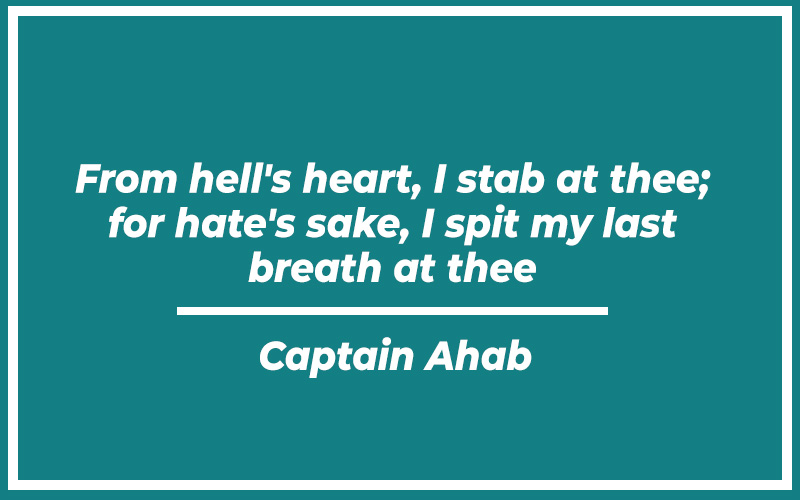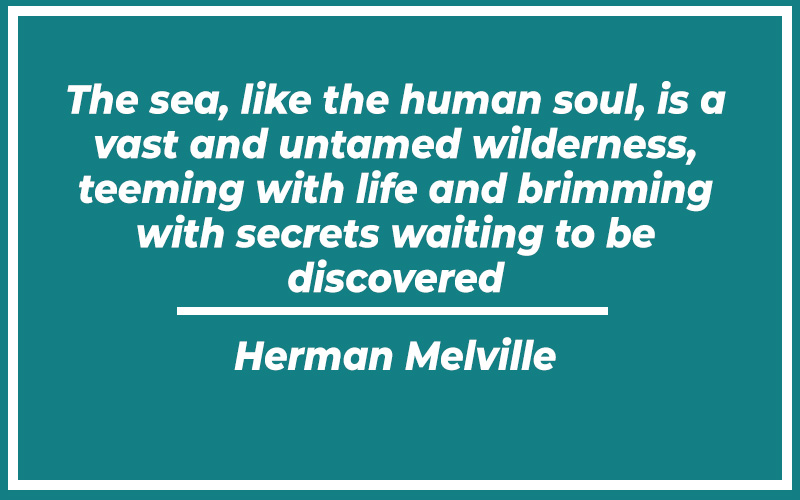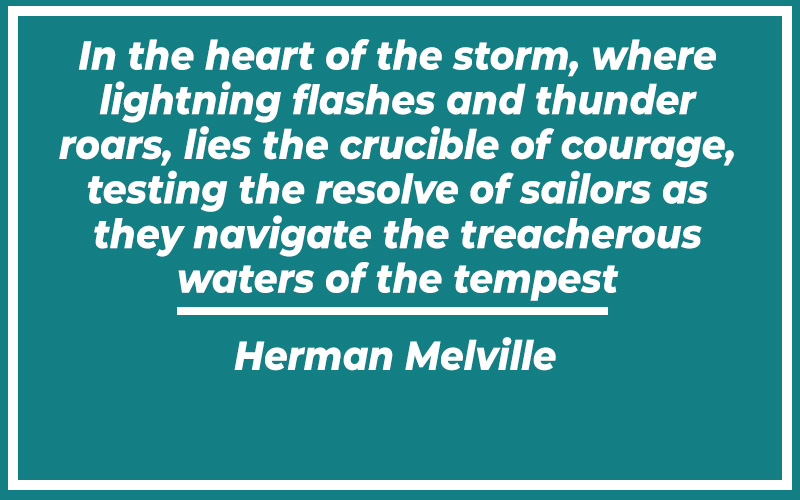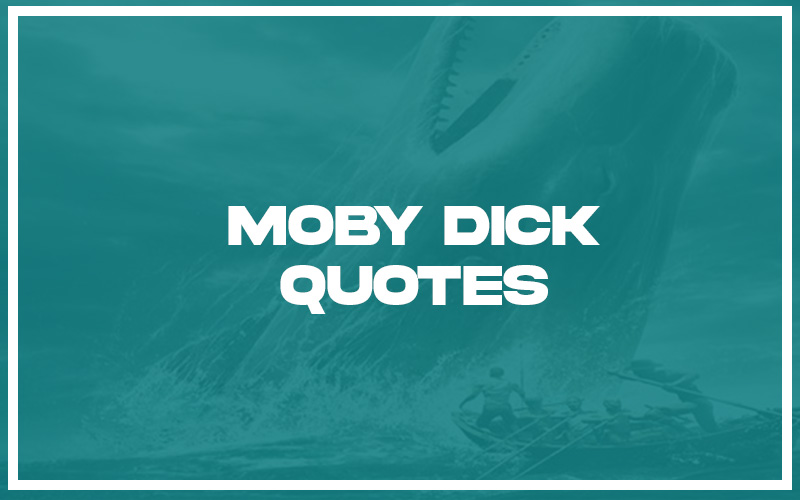Herman Melville’s Moby Dick is a literary masterpiece known for its epic storytelling and rich symbolism. But it’s the powerful quotes throughout the novel that truly resonate with readers.
These quotes capture the essence of the story:Captain Ahab’s obsessive quest for revenge against the white whale Moby Dick, the wisdom of narrator Ishmael, and the themes of good versus evil, obsession, and the vastness of nature.
Moby Dick Quotes

“From hell’s heart, I stab at thee; for hate’s sake, I spit my last breath at thee.” – Captain Ahab
Captain Ahab’s haunting words encapsulate his relentless pursuit of vengeance against the white whale, Moby Dick. Fueled by hatred and obsession, Ahab is willing to sacrifice everything, even his own life, in his quest for revenge.
This quote embodies the tragic and destructive consequences of unchecked ambition, as Ahab’s obsession with Moby Dick ultimately leads to his downfall.
*”I know not all that may be coming, but be it what it will, I’ll go to it laughing.” – Captain Ahab
Captain Ahab’s declaration of defiance in the face of fate highlights his unwavering resolve and fatalistic outlook. Despite the uncertainty of the future and the dangers that lie ahead, Ahab embraces his destiny with courage and determination.
This quote captures the essence of Ahab’s character, portraying him as a tragic figure who confronts his inevitable demise with grim humor and stoic acceptance.
*”From beneath his slouched hat Ahab dropped a tear into the sea; nor did all the Pacific contain such wealth as that one wee drop.” – Herman Melville
Herman Melville’s poignant description of Captain Ahab shedding a tear into the vast expanse of the Pacific Ocean symbolizes the depth of Ahab’s sorrow and despair. Despite his ruthless pursuit of vengeance, Ahab is not immune to moments of vulnerability and introspection.
This quote humanizes Ahab, revealing the emotional complexity beneath his facade of madness and obsession, and underscores the tragic nature of his quest for revenge.
“In the solitude of the open sea, where the only sound is the gentle lapping of waves against the hull, lies the sanctuary of the soul, a place of introspection and reflection where the cares of the world fade away.” – Herman Melville
Herman Melville’s description of the open sea as a sanctuary of the soul celebrates the transformative power of solitude and silence. This quote evokes a sense of peace and tranquility, portraying the ocean as a refuge from the noise and distractions of everyday life.
Melville’s imagery invites readers to embrace moments of introspection and reflection, recognizing the restorative nature of solitude and the profound connection between the human spirit and the natural world.
*”In the dance of sunlight upon the waves, where colors shimmer and refract, lies the beauty of the sea, a kaleidoscope of ever-changing hues that captivates the eye and stirs the imagination.” – Herman Melville
Herman Melville’s description of the sea as a “kaleidoscope of ever-changing hues” celebrates the breathtaking beauty of the ocean’s surface. This quote captures the enchanting interplay of light and water, portraying the sea as a mesmerizing spectacle that delights the senses and inspires wonder.
Melville’s vivid imagery invites readers to immerse themselves in the radiant colors of the sea, evoking a sense of awe and appreciation for the natural world’s boundless beauty.
*”The drama’s done. Why then here does any one step forth?—Because one did survive the wreck.” – Ishmael
Ishmael’s reflective observation at the conclusion of the novel encapsulates the theme of survival and resilience in the face of adversity.
As the lone survivor of the Pequod’s doomed voyage, Ishmael emerges from the wreckage to bear witness to the tragic events that unfolded at sea. This quote serves as a reminder of the fragility of human life and the enduring spirit of those who persevere against all odds.
*”In the heart of the ocean, where the boundaries of land and sea dissolve into oblivion, lies the realm of the Leviathan, a creature of myth and legend, whose ancient wisdom and unfathomable depths hold the secrets of the universe.” – Herman Melville
Herman Melville’s description of the Leviathan invokes the awe and wonder inspired by the mysterious creatures that inhabit the depths of the ocean. This quote reflects the novel’s exploration of the natural world’s boundless mysteries and the human quest for knowledge and understanding.
The Leviathan symbolizes the unknown and the unknowable, inviting readers to contemplate the profound mysteries that lie beyond the realm of human comprehension.
*”There is no folly of the beasts of the earth which is not infinitely outdone by the madness of men.” – Herman Melville
Herman Melville’s observation on the folly of mankind underscores the novel’s exploration of human nature and the destructive consequences of unchecked ambition. This quote reflects the novel’s critique of hubris and the relentless pursuit of power and glory at any cost.
Melville warns of the dangers of unchecked ambition and the folly of man’s relentless quest for dominance over the natural world, reminding readers of the tragic consequences of pride and arrogance.
*”It is not down on any map; true places never are.” – Herman Melville
Herman Melville’s reflection on the nature of true places highlights the novel’s theme of exploration and discovery. This quote encapsulates the idea that true knowledge and understanding cannot be found on a map but must be sought through personal experience and exploration.
Melville celebrates the intrepid spirit of adventurers and explorers who dare to venture into the unknown, seeking out hidden truths and uncovering the mysteries of the world.
“In the vast expanse of the ocean, where the horizon meets the sky, lies the threshold between the known and the unknown, beckoning explorers to venture forth into uncharted waters.” – Herman Melville
Herman Melville’s quote captures the allure of the open sea, portraying it as a realm of endless possibility and discovery. This evocative imagery invites readers to contemplate the mysteries that lie beyond the horizon and the adventures that await those brave enough to embark on a voyage of exploration.
Melville’s poetic language taps into the universal human desire for adventure and discovery, inspiring a sense of wonder and awe at the vastness of the natural world.
*”Beneath the surface of the waves, where light fades and darkness reigns, lies the realm of the deep, a world of silence and solitude where the secrets of the ocean are whispered to those who dare to listen.” – Herman Melville
Herman Melville’s description of the deep sea as a realm of silence and solitude evokes a sense of mystery and intrigue. This quote paints a vivid picture of the ocean’s depths as a place of profound stillness and ancient wisdom, where the secrets of the natural world are hidden from view.
Melville’s evocative imagery invites readers to imagine the wonders that lie beneath the surface of the water, sparking their curiosity and inspiring a sense of reverence for the mysteries of the deep.
“Behold the grand god of war, who has descended upon us with fire and fury, wreaking havoc upon the fragile vessels of men.” – Herman Melville
Herman Melville’s vivid imagery paints a powerful picture of the destructive force of nature embodied by the white whale, Moby Dick. This quote captures the awe and terror inspired by Moby Dick’s relentless pursuit of vengeance, portraying him as a mythical figure of immense power and wrath.
Melville’s evocative language immerses the reader in the chaotic and perilous world of the sea, highlighting the profound impact of the whale’s presence on the characters and the narrative.
*”In his heart, Ahab had secretly feared that Moby Dick was not merely a physical adversary, but a manifestation of his own inner demons, haunting him with the specter of his own mortality.” – Herman Melville
Herman Melville delves into the psychological depths of Captain Ahab’s character, revealing the inner turmoil and existential dread that fuel his obsession with Moby Dick.
This quote explores the complex interplay between Ahab’s personal demons and his external quest for vengeance, suggesting that the white whale represents not only a physical adversary but also a symbolic manifestation of Ahab’s deepest fears and insecurities.

“The sea, like the human soul, is a vast and untamed wilderness, teeming with life and brimming with secrets waiting to be discovered.” – Herman Melville
Herman Melville draws a parallel between the sea and the human soul, likening both to vast and untamed wildernesses full of untold mysteries. This quote invites readers to contemplate the parallels between the natural world and the inner landscape of the human psyche, highlighting the interconnectedness of all living things.
Melville’s metaphorical language evokes a sense of awe and wonder at the complexity and beauty of both nature and the human spirit, encouraging readers to explore the depths of their own souls with curiosity and reverence.
*”In the silence of the deep, where the sun’s rays cannot penetrate, lies the realm of the abyss, a dark and mysterious underworld inhabited by creatures of the unknown.” – Herman Melville
Herman Melville’s description of the abyss as a dark and mysterious underworld underscores the sense of awe and apprehension inspired by the depths of the ocean. This quote conjures images of a hidden realm teeming with strange and otherworldly creatures, shrouded in perpetual darkness and secrecy.
Melville’s evocative language transports readers to the depths of the sea, where the boundaries between reality and myth blur, inviting them to confront the mysteries that lie beneath the surface of the water.
*”In the heart of the tempest, where the winds howl and the waves crash with relentless fury, lies the crucible of fate, forging the destinies of men and beasts alike.” – Herman Melville
Herman Melville’s description of the tempest as a crucible of fate emphasizes the transformative power of adversity and chaos. This quote captures the intensity and unpredictability of the sea, portraying it as a realm where the forces of nature shape the destinies of all who dare to venture into its depths.
Melville’s vivid imagery evokes a sense of danger and excitement, drawing readers into the heart of the storm and immersing them in the elemental forces that govern the natural world.
Also Read: Top Thomas Shelby Quotes (with Explanation)
“Call me Ishmael.” – Herman Melville
Herman Melville‘s iconic opening line sets the tone for the epic journey that is “Moby Dick.” “Call me Ishmael” introduces the narrator and establishes a sense of intimacy with the reader, drawing them into the narrative.
Ishmael’s simple yet memorable introduction invites readers to join him on his adventure, promising a story filled with adventure, mystery, and profound philosophical insights.
*”Whenever I find myself growing grim about the mouth; whenever it is a damp, drizzly November in my soul; whenever I find myself involuntarily pausing before coffin warehouses, and bringing up the rear of every funeral I meet; and especially whenever my hypos get such an upper hand of me, that it requires a strong moral principle to prevent me from deliberately stepping into the street, and methodically knocking people’s hats off—then, I account it high time to get to sea as soon as I can.” – Herman Melville
In this passage, Ishmael reflects on his tendency to become melancholic and introspective, finding solace in the vastness of the sea. Melville masterfully captures Ishmael’s sense of existential ennui and his yearning for escape from the pressures of civilization.
This quote serves as an exploration of the human condition, highlighting the desire for freedom and adventure in the face of existential despair.
*”I know not all that may be coming, but be it what it will, I’ll go to it laughing.” – Herman Melville
As Ishmael embarks on his journey aboard the Pequod, he embraces the unknown with a sense of humor and resilience. Melville’s quote reflects Ishmael’s adventurous spirit and his willingness to confront the challenges that lie ahead with courage and optimism.
This line encapsulates the theme of fate and destiny in “Moby Dick,” underscoring Ishmael’s acceptance of whatever may come his way, whether it be fortune or misfortune.
“Aye, I widowed that poor girl when I married her, Starbuck; and then, the madness, the frenzy, the boiling blood and the smoking brow, with which, for a thousand lowerings old Ahab has furiously, foamingly chased his prey—more a demon than a man!—aye, aye! what a forty years’ fool—fool—old fool, has old Ahab been! Why this strife of the chase? why weary, and palsy the arm at the oar, and the iron, and the lance? how the richer or better is Ahab now?“” – Captain Ahab
In this introspective moment, Captain Ahab reflects on the toll his obsession with Moby Dick has taken on his life. Melville’s quote reveals Ahab’s awareness of his own folly and the futility of his quest for vengeance.
Despite his realization, Ahab is unable to break free from the grip of his obsession, highlighting the tragic inevitability of his fate. This passage serves as a poignant exploration of the human condition.
“In the twilight hours of the evening, when the sky is ablaze with hues of orange and pink, lies the magic hour of the sea, a time when the world is bathed in the soft glow of the setting sun.” – Herman Melville
Herman Melville’s description of the magic hour of the sea captures the ethereal beauty of dusk, painting a vivid picture of the ocean illuminated by the warm colors of the setting sun.
This quote evokes a sense of tranquility and wonder, inviting readers to witness the fleeting moments of natural splendor that occur as day transitions into night. Melville’s imagery celebrates the sublime beauty of the natural world, inspiring a sense of awe and reverence for the wonders of the sea.
*”In the depths of the abyss, where darkness reigns and silence prevails, lies the unknown frontier of the ocean, a realm of mystery and fascination that beckons explorers to delve into its depths.” – Herman Melville
Herman Melville’s portrayal of the abyss as an unknown frontier underscores the sense of intrigue and curiosity surrounding the unexplored depths of the ocean.
Melville’s evocative imagery invites readers to contemplate the secrets that lie hidden beneath the surface of the water, sparking their imagination and igniting a sense of wonder at the vastness of the unknown.
*”In the tumult of the waves, where foam crashes against rock and spray fills the air, lies the drama of the sea, a spectacle of raw power and untamed beauty that captivates the senses and stirs the soul.” – Herman Melville
Herman Melville’s description of the drama of the sea captures the dynamic energy and awe-inspiring power of the ocean in motion. This quote portrays the ocean as a force of nature that commands respect and admiration, evoking a sense of wonder and exhilaration in the face of its raw power.
Melville’s vivid imagery immerses readers in the thrilling spectacle of crashing waves and swirling foam, inviting them to experience the elemental forces that shape the world’s oceans.
*”In the silence of the night, when the stars sparkle overhead and the moon casts its silver glow upon the water, lies the mystery of the sea, a realm of enchantment and wonder that has captured the imagination of poets and dreamers for centuries.” – Herman Melville
Herman Melville’s portrayal of the mystery of the sea evokes a sense of wonder and reverence for the enchanting beauty of the nighttime ocean. This quote captures the ethereal atmosphere of the sea at night, portraying it as a realm of magic and enchantment that has inspired countless works of literature and art.
Melville’s evocative imagery invites readers to contemplate the timeless allure of the sea, sparking their imagination and inviting them to embark on a journey of exploration and discovery beneath the starlit sky.
*”In the ebb and flow of the tide, where currents swirl and eddies dance, lies the rhythm of the sea, a timeless symphony of motion and sound that echoes through the ages.” – Herman Melville
Herman Melville’s description of the rhythm of the sea captures the mesmerizing cadence of oceanic currents and tides. This quote portrays the sea as a living, breathing entity that pulses with energy and vitality, evoking a sense of harmony and balance in the natural world.
Melville’s poetic imagery invites readers to immerse themselves in the rhythmic movements of the ocean, inspiring a deeper appreciation for the interconnectedness of all living things and the eternal cycle of life and renewal that defines the sea.
*”Is it that by its indefiniteness it shadows forth the heartless voids and immensities of the universe, and thus stabs us from behind with the thought of annihilation, when beholding the white depths of the milky way? Or is it, that as in essence whiteness is not so much a color as the visible absence of color, and at the same time the concrete of all colors; is it for these reasons that there is such a dumb blankness, full of meaning, in a wide landscape of snows—a colorless, all-color of atheism from which we shrink?“” – Herman Melville
Herman Melville’s profound reflection on the symbolism of whiteness in “Moby Dick” delves into themes of existentialism and the human experience.
Melville’s lyrical prose invites readers to contemplate the deeper philosophical questions raised by the novel, challenging them to confront the inherent uncertainty and insignificance of human existence in the face of cosmic forces beyond their control.

“In the heart of the storm, where lightning flashes and thunder roars, lies the crucible of courage, testing the resolve of sailors as they navigate the treacherous waters of the tempest.” – Herman Melville
Herman Melville’s portrayal of the storm as a crucible of courage captures the bravery and resilience of sailors facing the wrath of nature.
Melville’s vivid imagery immerses readers in the chaos of the storm, evoking a sense of awe and admiration for those who brave its fury.
Also Read: Top Thomas Shelby Quotes (with Explanation)
Final Thoughts
These quotes show that Moby Dick is more than just an adventure story. It explores big questions about life and the world around us. Even though the book was written a long time ago, the ideas and characters are still interesting today.
So, if you’re looking for a book that will make you think and feel, Moby Dick might be a great choice!

